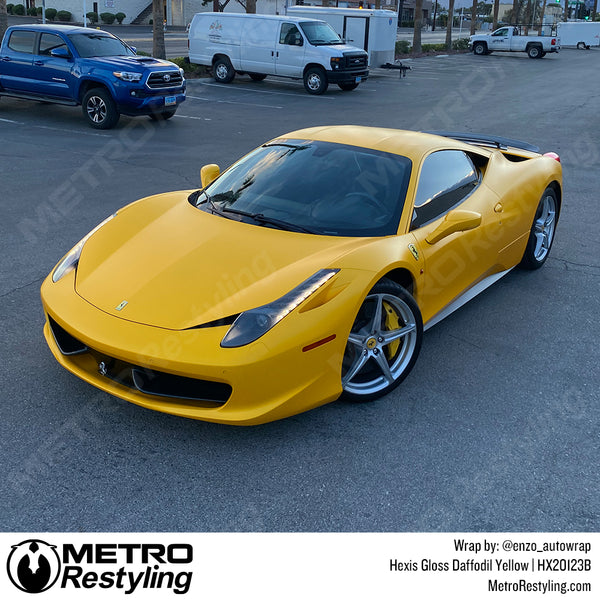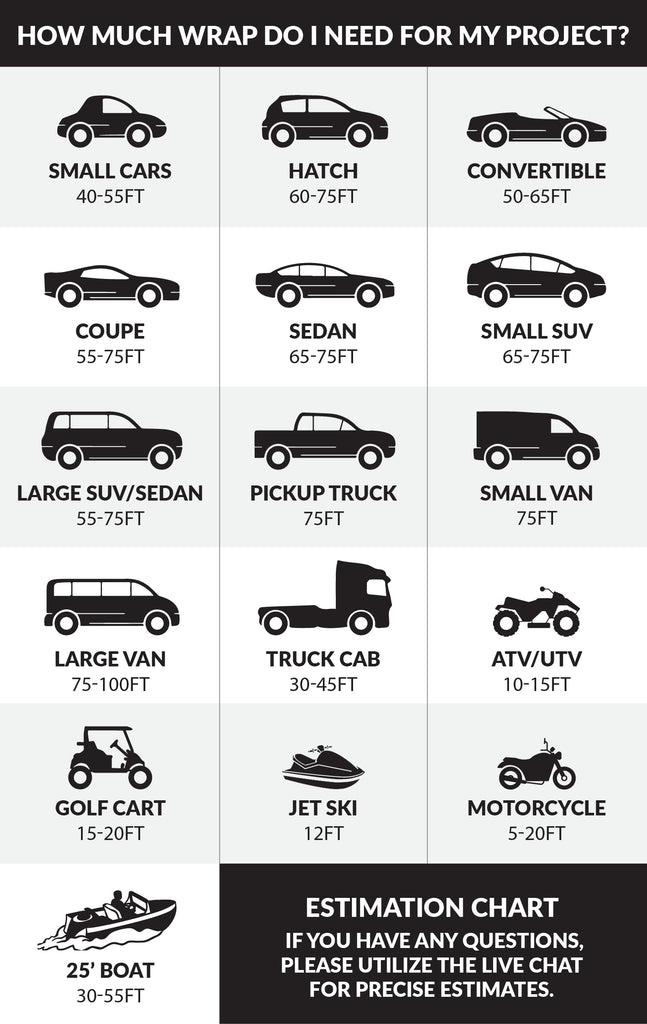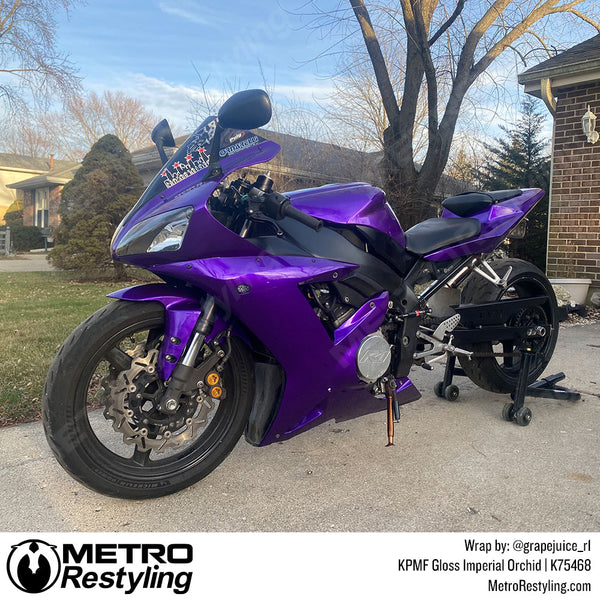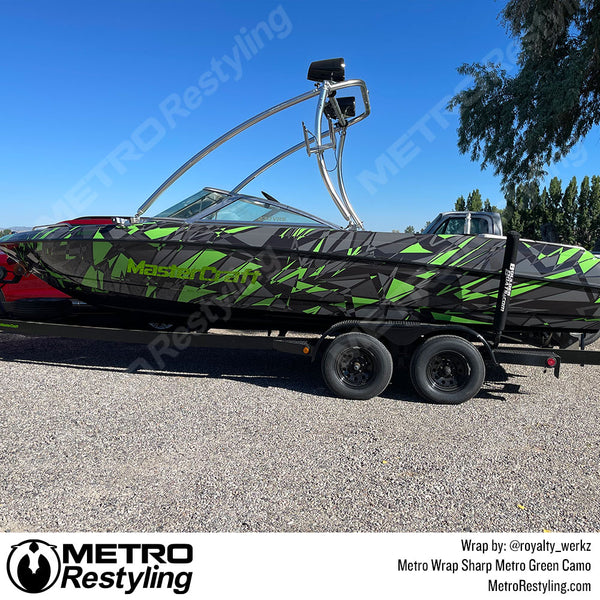If your interest in the notion of transforming your vehicle using vinyl wrap has caught your attention, you certainly have some questions before purchasing any vinyl. One of the most frequently posed questions in the vinyl wrapping industry is, "How much vinyl wrap do I need for my vehicle?" Determining the ideal vinyl wrap coverage is surely on your radar, whether you're considering a wrap to support your advertising efforts or are just looking to give your car a fresh, attention-grabbing look. Metro Restyling has guided how much wrap you need for specific vehicles, models, boats and more!

Estimates of Cars
As a general guideline, a small automobile will require between 50 and 75 feet of vinyl wrap, a mid-size car between 75 and 100 feet, and a big car between 100 and 125 feet. These estimates are for a full wrap covering the entire vehicle. You'll obviously need less vinyl if you only wrap certain vehicle parts (such as the hood or roof).

Popular Vehicle Models:
Ford:
- Ford Mustang: 55-65 feet
- Ford F-150: 90-110 feet
- Ford Focus: 50-60 feet
Tesla:
- Tesla Model S: 60-75 feet
- Tesla Model 3: 55-65 feet
- Tesla Model X: 70-80 feet
Chevrolet:
- Chevrolet Camaro: 55-65 feet
- Chevrolet Silverado: 90-110 feet
- Chevrolet Malibu: 55-65 feet
Toyota:
- Toyota Camry: 55-65 feet
- Toyota Corolla: 50-60 feet
- Toyota Tundra: 100-120 feet
Jeep:
- Jeep Wrangler: 70-80 feet
- Jeep Grand Cherokee: 80-90 feet
- Jeep Renegade: 55-65 feet
BMW:
- BMW 3 Series: 60-75 feet
- BMW 5 Series: 75-85 feet
- BMW X5: 80-95 feet
Lexus:
- Lexus IS: 60-70 feet
- Lexus RX: 75-85 feet
- Lexus LS: 85-95 feet
Subaru:
- Subaru Impreza: 55-65 feet
- Subaru Outback: 75-85 feet
- Subaru Forester: 60-75 feet
Nissan:
- Nissan Altima: 55-65 feet
- Nissan Rogue: 65-75 feet
- Nissan Titan: 100-120 feet
Volkswagen:
- Volkswagen Golf: 50-60 feet
- Volkswagen Jetta: 55-65 feet
- Volkswagen Atlas: 100-120 feet
Remember, these are just estimated ranges based on typical measurements. It's always a good idea to measure your vehicle and use a vinyl wrap calculator to estimate how much wrap you'll need.
How Much Wrap for a Motorcycle
The size and type of the motorbike and the wrap's design will determine how much vinyl you need for a motorcycle. You will need 5 to 10 feet of vinyl wrap for a little motorbike, while a bigger cruiser-style bike may require up to 25 feet. Measuring your motorcycle to estimate how much vinyl you'll need for your specific bike is always a good idea.

How much wrap for an ATV
ATVs, commonly referred to as quad bikes or four-wheelers, are common outdoor leisure vehicles that can be around 10-30 feet of vinyl. ATVs typically measure 7 feet long by 4 feet wide and 4 feet high. Based on these measurements, you will want around 10-30ft of wrap material to completely cover the ATV. However, if your ATV is bigger or smaller than usual, make the necessary adjustments to the calculations.
How much wrap for a boat
Boats are a popular target for vinyl wrapping as they spend their lives exposed to the elements, which can cause damage to the paint or gel coat. Wrapping a boat can protect its surface from fading, peeling, or cracking and enhance its appearance. The amount of wrap required for a boat varies depending on size and shape. Boats depend on the size and height; you can wrap the waterline up and take 25-75ft. If it's a 30" x 33ft boat, you will want to purchase a 60" x 35ft roll, cut it in half, and then have the extra leeway film. Ordering a bigger roll will be beneficial for more room for mistakes.
It's good to note that boats have many protruding parts like windows, handles, and rails that may require additional wrap. These areas may also require special attention during installation to ensure proper coverage and adhesion.

Extra tips and reminders
Choosing the right vinyl material and design for your needs is essential when wrapping a vehicle. High-quality vinyl is important to ensure durability and longevity. Major brands like 3M, Avery Dennison, Hexis, KPMF, and Metro Wrap are the top picks for high-quality vinyl film, all sold by us.
Ensure the surface is clean and clear of dust, dirt, and debris before installation. Any surface flaws might weaken the vinyl's adherence and reduce the wrap's longevity. If you don't, your film might have dust, debris, scratches, and rock chips. It is best to fix the surface if it has corrosion, severe scratches, or other damage before applying the wrap.
Consider the weather conditions during installation. Vinyl wraps are best installed in a dry, dust-free environment at 65-80 degrees Fahrenheit. Extreme heat or cold can affect the adhesive properties of the vinyl and compromise its durability.
Lastly, choose a professional installer with experience in wrapping vehicles. Improper installation can affect the wrap's durability and appearance and compromise the vehicle's safety.
Style Your Vehicle With Metro Restyling
A car wrap is a great method to preserve and improve the look of your car. Depending on a vehicle's size and form, different amounts of the wrap are needed; therefore, estimates must be modified. It is always best to buy more material, especially if you are a beginner. When wrapping a vehicle, choosing the right vinyl material, design, and installer is to ensure durability and longevity.
FAQ:
Q: What is the average amount of wrap needed for a car?
A: Different amounts of vinyl wrap are required depending on the size and kind of automobile. A full automobile wrap typically takes between 50 and 75 feet of cloth.
Q: Do I apply vinyl wrap wet or dry?
A: Your choice of vinyl wrap will determine this. Some wraps must be applied wet, which involves misting a solution onto the side with the adhesive before sticking it to the car. Other wraps are made to be applied dry, requiring just that you peel and apply the wrap to the car.
Q: How much does it cost to wrap a vehicle?
A: The size and kind of the vehicle, the material's quality, and the design's intricacy all affect how much a car wrap costs. Costs for a complete car wrap range from $2,000 to $5,000. However, partial wraps or simpler patterns may have a reduced price tag.

















1 comment
Gerald
I have a Polaris Slingshot. How much wrap would I need?